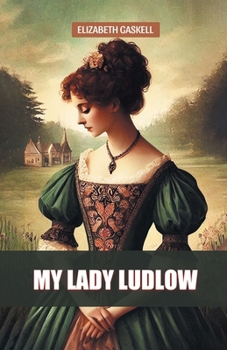My Lady Ludlow
Select Format
Select Condition 
Book Overview
"My Lady Ludlow" by Elizabeth Cleghorn Gaskell is a novella exploring social class, duty, and societal change through the lens of a young woman's experiences with a noblewoman. The story begins with the narrator reflecting on her childhood and her family's economic struggles following her father's death. The turning point comes when Lady Ludlow, a traditional and aristocratic woman, offers to help the narrator's family. As the story unfolds, the contrast between Lady Ludlow's conservative values and the emerging ideas of progress, particularly regarding education and social mobility, becomes apparent. The narrative reveals Lady Ludlow's insistence on maintaining the social order while grappling with the evolving roles of women and the lower classes. Key figures like the new clergyman, Mr. Gray, challenge these traditional views, creating tension between duty, tradition, and compassion. The story highlights the conflict between old social norms and the new possibilities for progress, particularly regarding education and social change, setting the stage for deeper reflections on societal evolution.
Format:Paperback
Language:English
ISBN:9369073515
ISBN13:9789369073511
Release Date:January 2024
Publisher:Double 9 Books
Length:168 Pages
Weight:0.44 lbs.
Dimensions:0.4" x 5.5" x 8.5"
Customer Reviews
1 rating
Change comes to Hanbury....
Published by Thriftbooks.com User , 16 years ago
Elizabeth Gaskell, author of "Cranford" and other excellent stories of mid-19th century England, winds the clock back in a charming tale of change. "My Lady Ludlow" is the story of the small rural village of Hanbury around the year 1800, its ways unchanged for centuries. The noble Lady Ludlow presides over the village, kind-hearted but firm in her beliefs in the existing social order and the evils of too much education. Her ways are challenged by, among others, a young and earnest clergyman who wants to build a schoolhouse, and her own estate steward, who wishes to improve the son of a local poacher. The story is narrated by one Margaret Dawson, a distant and poor relative of Lady Ludlow, who is offered the chance to be properly raised as a gentlewoman. Margaret is witness to a series of episodes involving different people in the village, whose lives all seem eventually to intersect in the person of Lady Ludlow. The Lady Ludlow, despite her attachment to old ways, is too kind and too sensible not to do the right thing for her friends, employees, and tenants. Her dispute with her steward, for example, weaves through most of the book, before being resolved by a decisive act of kindness by the steward that saves Lady Ludlow and the young boy. This and other story twists that brings her to the right thing are often told with humor but filled with acute insight into human nature. Gaskell has captured the genuine push and pull of real people trying to adapt to changing times. Her insights are honest ones; there are no heroes or villains, only real people dealing with real life. The Lady Ludlow's prejudice against education, for example, are given a plausible basis in a hair-raising and ultimately tragic story about two refugees from the French Revolution whom the Lady attempts to help. Gaskell has captured the flavor and texture of a by-gone era in "My Lady Ludlow." Some of the characters and episodes from "My Lady Ludlow" were adapted into the BBC/Masterpiece Theater presentation "Cranford." "My Lady Ludlow" is highly recommended to fans of Masterpiece Theater as the rest of the story and as a fine example of Elizabeth Gaskell's work.







